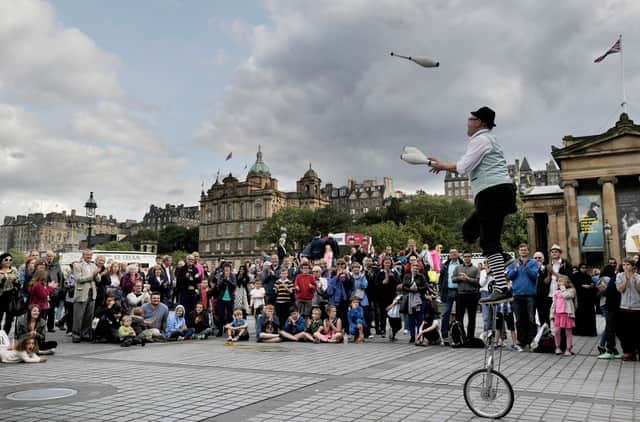Questioning Edinburgh's 'festivalisation' doesn't make you a snobby anti-culture curmudgeon - Cliff Hague


To suggest the Cockburn is ‘against the Fringe and the city’s other main cultural events’ misses the point. The Cockburn is for the festivals. It is against the festivalisation of Edinburgh.
Festivalisation means that festivals and the events industry take over the city. They spread through the year, they commandeer public spaces, they intensify the use of those spaces, they displace local residents, pop up competitors to local businesses, undermine the planning system, and subordinate people and the environment to their own imperatives.
Advertisement
Hide AdAdvertisement
Hide AdAbove all festivalisation forces the festivals to grow, year on year, for ever and ever, to stay ahead of competitors. Success only means increasing the numbers – of shows, tickets sold, and tourists.
This growth model was forged a decade ago, and then delivered. In 2010, the Chair of the Edinburgh Tourism Action Group enthused that ‘The Festivals in Edinburgh play a key role in driving tourism growth’, while the Director of Festivals Edinburgh returned the compliment, writing ‘The support of Edinburgh’ s tourism businesses is crucial to the ongoing development and growth of the major festivals taking place throughout the year’. Bigger festivals equals more tourists equals bigger festivals, ad infinitum. In this spirit the Tattoo increased its capacity by 35%.
Edinburgh’s Events Strategy states that ‘Edinburgh will continue to grow as one of the world’s finest events cities’. It aims to deliver a balanced portfolio of events over the next ten years to include established successful events, newly created or commissioned events and national or international events won for the city through bidding processes.
Consequently, driving growth has been a major part of the work of, and achievement of, the Fringe Society. In 2010 there were 40,254 performances in 259 venues and 1.8 million tickets were sold. In 2019 there were 59,600 performances in 323 venues and an additional million tickets sold. Covid intervened, but crudely projecting this growth rate from now would equate to over 80,000 performances and around 4 million tickets by 2030, the year Edinburgh plans to be zero carbon.
While the Cockburn Association was the first to call for a rethink, others have followed. Being concerned about the impact of this pace of growth and its consequences does not make you a snobby anti-culture curmudgeon. Shona McCarthy, chief executive of the Fringe Society, was quoted in mid-July as saying ‘We need a more sophisticated conversation about managing tourism because this will always be a city with tourists and people will want to come here whether there is a festival or not.’
The Edinburgh International Book Festival Director Nick Barley recently commented that it was time for the entire festival industry in the city to reinvent itself, having become ‘out of control in the 2010s’.
Edinburgh International Festival director Fergus Linehan said the city’s events sector has ‘created some real problems’ which have ‘not engendered a sense of shared cultural or financial dividend’ between event promoters and local citizens.
The August and Winter festivals concentrate activity in the city centre, yet back in 2016 the tourist industry itself recognised “the popularity of Edinburgh’s core Old and New Town area is creating increasing challenges as visitor numbers grow’, threatening ‘the quality of the visitor experience’ while also creating “friction between residents and the tourism sector”.
Advertisement
Hide AdAdvertisement
Hide AdBy 2018, the city’s economic strategy was expressing similar concerns, observing ‘negative impacts’, with "unmanaged growth perceived as a risk to both quality of life for residents and to the natural environment of the city”.
It is beyond dispute that there are issues; a head in the sand attitude will not resolve them. Of course, Covid has had a massive deleterious effect, but sweeping aside in the cause of economic recovery the problems caused by festivalisation risks entrenching and compounding them.
We have seen the planning system, probably the main lever for conserving Edinburgh’s World Heritage status, sidelined to allow constructions for the Fringe to ignore it. The conversion of public spaces into commercial assets is another price citizens are expected to pay: it is a defining feature of festivalisation internationally. Spaces become assigned to the highest bidder, and commerce eventually trumps culture. The displacement of street performers from the Mound precinct for a Johnny Walker pop-up bar is a signpost to where this leads. The Old Town, so fundamental to the essence of Edinburgh through its unique cultural combination of buildings, uses and people, is being bought up by Airbnb investors, its streets claimed by tourist buses, its once local shops squeezed out by tartanry and cashmere. Every citizen has a right to the city: access to our streets, squares and parks should not blocked by entry charges or security companies.
The Cockburn wants the festivals to enhance, not diminish the city. Since the festivalisation problem became pressing, the Cockburn has led the way in making constructive suggestions: disperse events, keep off the grass, spread the load through the year, support local talent, assess area capacity, factor in environmental sustainability and carbon reduction, don’t block views with hoardings or lock people out of their parks, don’t risk public health during a pandemic, support local businesses not pop-up bars and foodstalls, control the noise, and respect residents’ rights and the planning system.
Reinvention is not decline or cancellation, it is creativity, and creative thinking is now needed to refit the festivals to the city.
